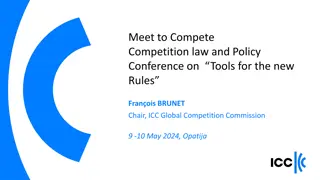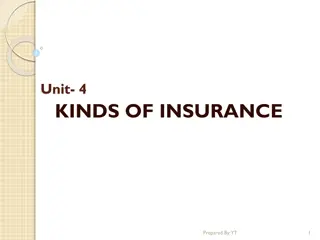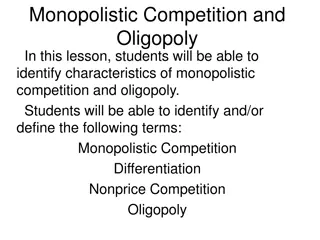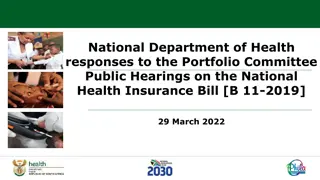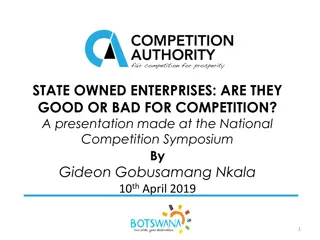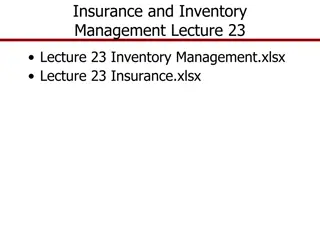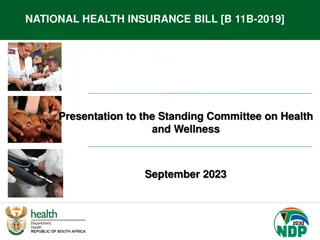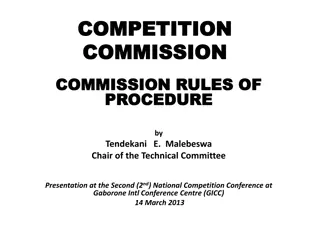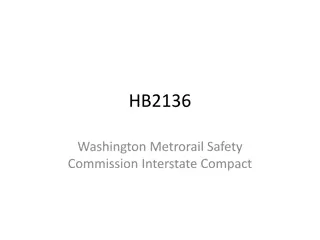Competition Commission Comments on the National Health Insurance Bill
The Competition Commission supports the overall objectives of the NHI Bill but raises concerns about the potential exemption from the Competition Act for the National Health Insurance Fund. The Commission emphasizes the need for clarity and careful consideration to prevent anti-competitive behavior and ensure accessible, quality healthcare services.
Download Presentation

Please find below an Image/Link to download the presentation.
The content on the website is provided AS IS for your information and personal use only. It may not be sold, licensed, or shared on other websites without obtaining consent from the author.If you encounter any issues during the download, it is possible that the publisher has removed the file from their server.
You are allowed to download the files provided on this website for personal or commercial use, subject to the condition that they are used lawfully. All files are the property of their respective owners.
The content on the website is provided AS IS for your information and personal use only. It may not be sold, licensed, or shared on other websites without obtaining consent from the author.
E N D
Presentation Transcript
COMPETITION COMMISSION COMMENTS ON THE NATIONAL HEALTH INSURANCE BILL Competition Commission 28 Jan 2022 10:15 am
Introduction 1. The Commission acknowledges and supports the overall objectives of the NHI Bill in achieving a unified health care system for the country. 2. The Commission s submission is primarily directed at contributing to the NHI Bill in so far as it affects the application of the Competition Act. 3. The Commission, to a limited extent, also makes submissions where such may assist in ensuring the clear reading and application of the Bill. 4. The Commission has not made comments addressing the future design of the NHI as much of this is currently unclear. 5. The main body of the Commission s submission is focused on discussing the proposed exemption from the Competition Act of 1998 (as amended) ( theAct ).
Applicable sections of NHI Bill 1. In section 3(5), which refers to the application of the NHI Act, it is noted that: The Competition Act, 1998 (Act No. 89 of 1998), is not applicable to any transactions concluded in terms of this Act . This suggests that the exemption applies to both the Fund as well as other parties with which it will contract. 2. Section 58 of the Bill amends section 3 of the Competition Act as follows: a. By the substitution in subsection (1) for paragraph (b) of the following paragraph: (b) a collective agreement, as defined in section 213 of the Relation Act, 1995; [and] ; and b. By the insertion in subsection (1) after paragraph (b) of the following paragraph: (bA) the operations of the National Health Insurance Fund by section 9 of the National Health Insurance Act, purchaser and single payer of health Labour established 2019, as a single public care services; .
Our submission 1. It is not clear whether this provision suggests that only the Fund, which will be the single public purchaser and payer of health care services, will be exempt from the Competition Act, or whether this will extend to additional parties to transactions with the Fund. The Bill contemplates that the operations of the Fund may be performed by third parties, which would render the provisions of section 3 of the Competition Act to be applicable to such third parties too. 2. Our submission is that this blanket and ambiguous exemption is particularly dangerous as this would exempt anti-competitive conduct on behalf of those that contract with the Fund which would undermine the Fund s core purpose of contracting at the lowest cost. 3. This in turn would undermine the goal of the NHI to achieve sustainable and affordable universal access to quality health care services .
Cont 1. Furthermore, even if narrowly construed, it would exempt activities of the Fund which result in uncompetitive outcomes and which should rightly not be exempt from competition law oversight. 2. Given that the final design of the NHI has not been completed, it is premature to presume that all activities undertaken by the NHI Fund should be exempt. 3. Any exemption should be based on a careful consideration of the potential consequences.
A broad exemption would be counterproductive and undermine the goals of the NHI 1. The application of the Competition Act to any transactions concluded in terms of [the Bill] is expressly excluded by section 3 of the Bill. 2. This can reasonably be interpreted as excluding the application of the Competition Act to not only the NDoH, the Fund, the District Management Offices and other offices created by the Bill, but also from all private parties transacting in any way in terms of the Bill. 3. It renders the Commission unable to investigate or prosecute any anti- competitive conduct, of whatever nature, as long as it can be contended that it was concluded in terms of the Bill.
Cont 1. The Commission understands that it is not unusual for social health insurance systems to be exempt from competition law enforcement in certain circumstances. 2. In Europe for example, where social health insurance systems are common, there are broadly two main exemptions that are relevant to public healthcare. i. Firstly, competition law does not apply to entities that are not undertakings. ii. Secondly, undertakings are exempted if they are entrusted with the operation of a service of general economic interest ( SGEI ). However, what is unusual, if not unheard of, is the blanket exemption of entire social healthcare systems from competition law enforcement.
Collusion 1. It is not uncommon for firms to collude when bidding for government tenders and it is only the deterrence effect of competition law enforcement which limits this practice. 2. There is no reason to suggest that the same will not occur in relation to the NHI Fund. 3. In fact, the Commission has prosecuted many cases of collusive tendering for government contracts. 4. For example, Adcock Ingram Critical Care signed a consent agreement which admitted that it and its competitors were involved in collusive tendering in a state tender for intravenous medical products.
Cont 1. There have been a number of cartel cases involving the healthcare system that have been deemed anti-competitive in Europe. This is despite the prevalence of social health systems there. These have involved: i. Healthcare professional services ii. Pharmaceutical industry iii. Medical device industry iv. Related-services industries 2. Without the application of competition law, there is a risk that there will be nothing to constrain the Fund s suppliers from colluding and thereby constraining the ability of the Fund to obtain lower prices (at a reasonable level of quality) for the benefit of users. Alternatively, coordination could occur in respect of offering a lower quality service in response to low prices being set by the Fund.
Abuse of Dominance 1. There have been a number of successful abuse of dominance cases against healthcare service providers in Europe despite the prevalence of social health systems there: i. Predatory pricing ii. Bundling iii. Price Discrimination iv. Exclusionary acts
Merger Control 1. Where suppliers of the NHI Fund merge such they will have market power, there is a risk that the Fund will not be able to negotiate the lowest possible price for goods and healthcare services . 2. This applies to merger enforcement of both healthcare service providers (e.g. hospitals, pharmacies, pharmaceutical companies, etc) as well as equipment and consumables providers (e.g. suppliers of hospital bedding, disinfectants, etc). 3. Arguably, if a broad interpretation is taken then the Commission may be unable to examine the negative consequences of mergers of entities that transact with the Fund.
Cont 1.The recent amendments to the Competition Act attempt to address the issue of creeping mergers to some degree. 2.The Commission and Tribunal are required to consider when assessing whether a merger is anti-competitive whether there have been any other mergers engaged in by a party to a merger for such period as may be stipulated by the Competition Commission . 3.Furthermore, no provisions are contained within the Bill for the monitoring or penalisation of anti-competitive conduct that is not in accordance with its social objectives. 4.Finally, the blanket exemption is likely to have ripple effects beyond the NHI itself and into out-of-pocket or complementary / top up medical cover by medical schemes as envisaged within the NHI Bill. 5.There is a risk that independent service providers contracting with the Fund may leverage their transactions with the Fund to benefit their other commercial activities.
Interpretation/Clarificatory issues 1. A number of examples in which the NHI Bill is unclear but affect the scope of a blanket exemption are provided below. This is not a comprehensive list but does touch on the main issues of concern. a. Ability of users to choose the healthcare providers at which they are registered. b. How active and strategic purchasing will be performed and selective contracting. c. Decision making powers of Contracting Units. d. Ability of Contracting Units to contract with providers outside the sub-district. e. Whether the Fund will contract with only Contracting Units at the primary health level. f. The role of collective bargaining. g. Role of medical schemes under the NHI. h. Ability of users to use services other than those for which they have registered. i. The way in which providers will be reimbursed. j. Price setting and negotiation. k. Whether private and public providers will compete. l. How health-related innovations will be incorporated timeously under the NHI. m. The authority of the NHI Fund to purchase or otherwise acquire goods, equipment, land, buildings, and any other kinds of movable and immovable property. 2. The above examples show that lots of the design elements of the NHI still need to be ironed out. Depending on the eventual design of the NHI, the potential scope of the exemption provided under a broad interpretation may have very far reaching consequences in terms of competition law enforcement.
Conclusions 1. The Commission is of the view that the blanket exemption from the Competition Act contained in the draft NHI Bill is inappropriate and will jeopardise the broader public interest that the NHI is trying to achieve. 2. Such a blanket exemption is unnecessary to protect the specific activities of the NHI Fund that genuinely warrant exemption from the Act (section 10 exemption processes, including block exemptions). 3. In order to facilitate cooperation with the Fund, and as the NHI Bill may create areas of concurrent jurisdiction, an MOU between the Fund and the Competition Commission may be helpful to ensure a close and cooperative working relationship. 4. Finally, the Commission recommends the Department of Health engage with and draw on the findings of the HMI as it works out the details of how the Fund will function especially given the similarities in the reforms proposed.



![Stakeholders' Responses to National Health Insurance Bill [B.11B-2019]: Overview](/thumb/69945/stakeholders-responses-to-national-health-insurance-bill-b-11b-2019-overview.jpg)

